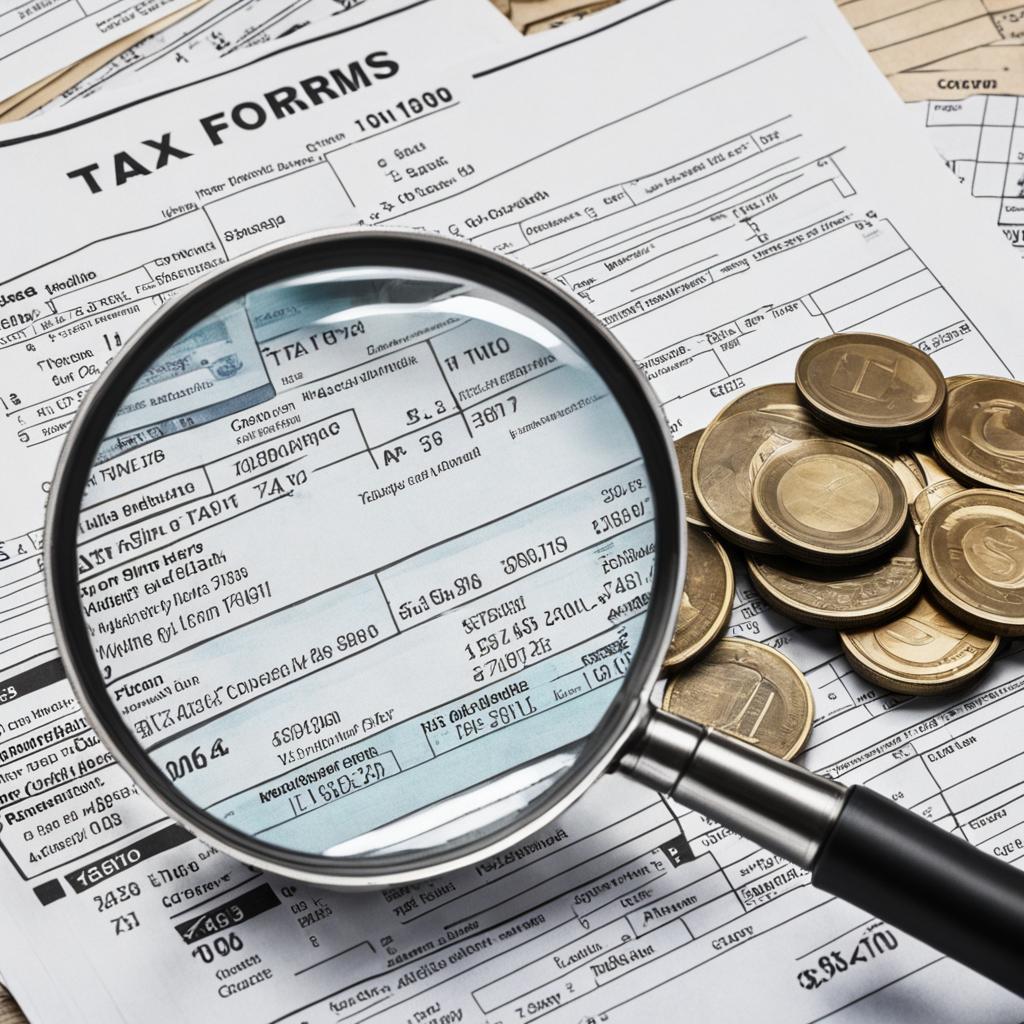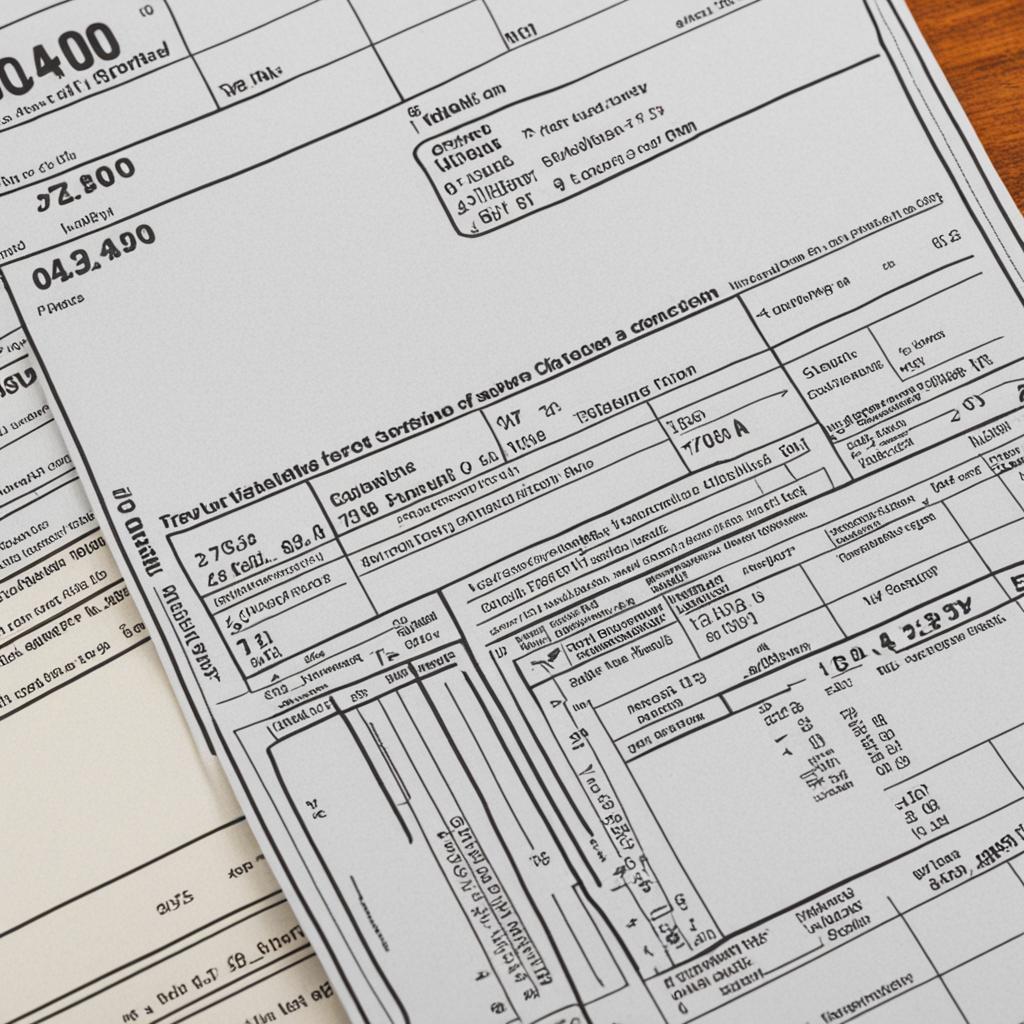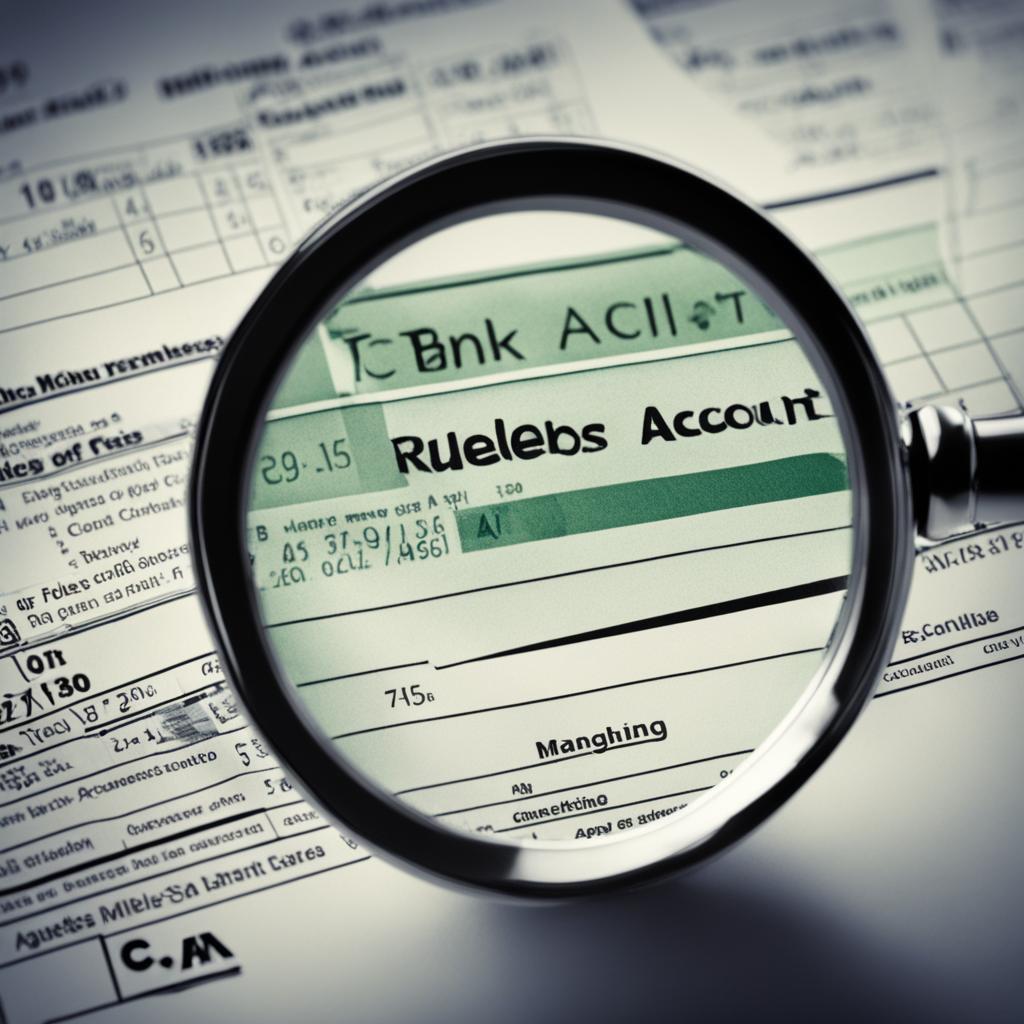When it comes to managing our finances, understanding the tax implications of our checking accounts is essential. While checking accounts are a convenient tool for everyday banking, they can also have tax implications that we need to be aware of. In this article, I will discuss the taxable income from checking accounts and the tax rules that apply.
Firstly, it’s important to note that the Internal Revenue Service (IRS) requires taxpayers to report interest from all taxable accounts, including checking accounts. Even if the interest earned is minimal, it should still be reported as ordinary income. Financial institutions are only required to send form 1099-INT to customers who generate more than $10 in interest. However, if your bank doesn’t send you a 1099 form, you are still obligated to report the income and pay any taxes owed.
Key Takeaways:
- Interest earned from checking accounts is considered taxable income and should be reported to the IRS.
- Financial institutions are only required to send form 1099-INT if you generate more than $10 in interest.
- If your bank doesn’t send a 1099 form, you are still responsible for reporting the income and paying taxes on it.
- Properly tracking and reporting savings interest is crucial, especially for high-yield savings accounts.
- Consider setting money aside for tax payments and consult a tax advisor to minimize your tax liability.
How to Pay Taxes on Your Checking Account
Paying taxes on a checking account is relatively straightforward. First, wait for the bank to send you a 1099 form. If they don’t, check your bank statement to determine the amount of interest you earned. Fill out form 1099-INT with this information and pay the balance as instructed. It’s important to accurately report and pay any taxes owed to avoid penalties or interest.
Tax rules for checking account
When it comes to paying taxes on your checking account, it’s essential to follow the tax rules and regulations set by the IRS. Reporting the interest earned on your checking account is a crucial part of fulfilling your tax obligations.
“Accurately reporting your checking account income and paying the taxes owed is not only a legal requirement but also ensures that you remain in compliance with IRS regulations.”
Waiting for the bank to send you a 1099 form is the first step in paying taxes on your checking account. Banks are typically required to send a 1099-INT form to customers who generate more than $10 in interest. However, even if you don’t receive a 1099 form, you are still obligated to report the income and pay any taxes owed.
IRS regulations for checking account taxes
The IRS regulations for checking account taxes require you to accurately report your interest income and pay any taxes owed. To ensure compliance with these regulations, follow these steps:
- Wait for the bank to send you a 1099 form. If you don’t receive one, proceed to the next step.
- Check your bank statement to determine the amount of interest you earned.
- Fill out form 1099-INT with the information obtained.
- Pay the balance as instructed on the form.
By following these steps, you can fulfill your tax obligations and avoid any penalties or interest charges that may arise from non-compliance.
Checking account tax obligations
As a taxpayer, you have the obligation to accurately report and pay taxes on the interest earned from your checking account. Failing to do so can result in penalties, interest charges, and potential audits by the IRS.
“Meeting your checking account tax obligations is not only a legal requirement but also ensures that you maintain compliance with IRS regulations and avoid any unnecessary financial consequences.”
Make sure to keep records of your checking account activity, including the interest earned, to accurately report this information when filing your tax return. It’s crucial to stay proactive and fulfill your tax obligations to maintain financial integrity.
| Tax Obligations | Importance |
|---|---|
| Accurately reporting interest income | Ensure compliance with IRS regulations |
| Paying taxes owed | Avoid penalties and interest charges |
| Maintaining thorough records | Proactively manage your tax obligations |
Tracking and Reporting Savings Interest to the IRS
When it comes to managing your finances and taxes, it’s important to keep a close eye on the interest you earn from your savings accounts, especially if you have a high-yield savings account. These types of accounts often generate more interest income, which means you need to be diligent in tracking and reporting this income on your tax return.
Not accurately reporting your savings interest can have serious consequences. The IRS may impose penalties and, in some cases, even initiate audits if they discover unreported income. To avoid these issues and ensure compliance, here are some key steps to track and report your savings interest:
1. Keep Detailed Records
Start by creating a system to track the interest you earn from your savings accounts. Keep a record of the account names, financial institutions, interest rates, and the interest earned for each account. This documentation will serve as evidence when reporting your income to the IRS.
2. Gather Statements and Documentation
Collect all the necessary statements and documentation related to your savings accounts. This includes bank statements, 1099-INT forms, and any other documents provided by your financial institutions. These records will help you accurately determine the amount of interest you earned throughout the year.
3. Report Your Savings Interest on Schedule B
When filing your tax return, use Schedule B (Interest and Ordinary Dividends) to report your savings interest. This form allows you to list each financial institution and the corresponding amount of interest you earned. Be sure to accurately report the interest income from all your savings accounts.
4. Utilize Tax Software or Consult a Professional
If you’re unsure how to accurately report your savings interest or prefer assistance with your taxes, consider using tax software or consulting a tax professional. These resources can help you navigate the process, ensure accurate reporting, and maximize any potential deductions or credits related to your savings interest.
5. Be Aware of Thresholds and Reporting Requirements
It’s important to note that financial institutions are only required to send form 1099-INT to customers who generate more than $10 in interest. However, even if you don’t receive a 1099-INT form, you are still obligated to report the interest income and pay any taxes owed. Don’t overlook any interest earned, regardless of the amount.
By diligently tracking and accurately reporting your savings interest, you can fulfill your tax obligations and avoid penalties or audits. Remember, it’s always better to be proactive and transparent when it comes to reporting and paying taxes on your checking account and other financial accounts.
Now that you understand the importance of tracking and reporting savings interest, let’s move on to section 4, where we’ll share some valuable tips for managing your taxes.
Tips for Managing Taxes
When it comes to managing taxes on your checking account, there are a few tips to keep in mind. By following these tips, you can effectively handle your tax liability and ensure that you are paying taxes on your checking account interest responsibly.
Set Money Aside for Tax Payments
One important tip is to set money aside specifically for tax payments. This ensures that you have the funds available to cover your tax obligations when they arise. By setting aside a portion of your income regularly, you can avoid any financial strain or surprises when tax season arrives. Treat your tax payments as a priority, just like any other bill or financial obligation.
Be Diligent About Withholding Taxes
If you are self-employed or generate income from sources other than a traditional job, it’s crucial to be diligent about withholding taxes. Unlike traditional employment, where taxes are automatically deducted from your paycheck, self-employed individuals are responsible for calculating and paying their own taxes. By staying on top of your withholdings, you can avoid a large tax bill at the end of the year and manage your tax liability effectively.
Hire a Tax Advisor or Use Tax Preparation Software
Navigating the complexities of tax rules and regulations can be challenging. To ensure you are minimizing your tax liability and taking full advantage of any deductions or credits available to you, consider hiring a tax advisor or using tax preparation software. These professionals can help you navigate the process, answer any questions you may have, and ensure that you accurately report your checking account income and pay any taxes owed.
Take Advantage of Deductions and Credits
Another important tip for managing taxes on your checking account is to take advantage of any deductions and credits that you qualify for. Keep track of your expenses throughout the year and explore potential deductions, such as the home office deduction or education-related credits. By maximizing your deductions and credits, you can potentially reduce your overall tax liability and keep more money in your pocket.
Taking proactive steps to manage your tax liability is essential for responsible financial planning. By setting aside money for tax payments, staying on top of withholding taxes, seeking professional advice, and taking advantage of available deductions and credits, you can effectively manage your tax obligations and ensure compliance with tax regulations. Remember, every individual’s tax situation may vary, so it’s important to consult with a tax professional for personalized advice.
Look for Special Deductions
When filing your tax return, it’s important to explore any special deductions that may apply to your situation. These deductions can help reduce your overall tax bill and potentially save you money. One deduction to consider is the home office deduction, which may be available if you work from home.
Working from home can allow you to claim a home office deduction, which can help reduce your taxable income. To qualify for this deduction, you must use a portion of your home exclusively for business purposes and meet certain IRS requirements. Consult a tax professional or refer to IRS guidelines to ensure you meet all the necessary criteria.
Additionally, there may be other deductions related to your checking account taxes that you should be aware of. For example, if you made charitable contributions directly from your checking account, you may be eligible for a tax deduction. Research and understand the available deductions that pertain to your situation to potentially maximize your savings.
“Exploring and taking advantage of special deductions can significantly reduce your tax bill. Don’t overlook these opportunities to potentially save money!”
To help you understand the deductions available, here’s a table outlining some common deductions related to checking account taxes:
| Deduction | Description |
|---|---|
| Home Office Deduction | A deduction for individuals who use a portion of their home exclusively for business purposes. |
| Charitable Contribution Deduction | A deduction for donations made directly from your checking account to qualifying charitable organizations. |
| Education Expenses Deduction | A deduction for certain education-related expenses, such as tuition and fees. |
| Medical Expenses Deduction | A deduction for qualified medical expenses that exceed a certain percentage of your adjusted gross income (AGI). |
Keep in mind that specific requirements and limits may apply to each deduction. Consult a tax professional or refer to IRS guidelines for complete information.
By taking the time to research and understand the deductions you qualify for, you can potentially reduce your tax bill and keep more money in your pocket.
Explore the available deductions and consult a tax professional to ensure you take full advantage of all the deductions that apply to your situation.
Better Ways to Earn Interest
If you’re disappointed with the low interest rates offered by checking accounts, there are alternative options available that can help you earn more interest on your money. Consider exploring the following:
1. Money Market Accounts
A money market account is a type of savings account that typically offers higher interest rates compared to regular checking accounts. These accounts often have a higher minimum balance requirement, but they can provide a better return on your savings.
2. Certificates of Deposit (CDs)
Certificates of Deposit, also known as CDs, are time deposits offered by banks. By depositing money into a CD for a fixed period, you can earn a higher interest rate. The longer the term of the CD, the higher the interest rate usually is. It’s important to note that CDs typically have early withdrawal penalties if you need to access your funds before the maturity date.
3. Brokerage Accounts
If you’re willing to take on some investment risk, a brokerage account can provide even higher potential returns. By investing in stocks, bonds, or mutual funds through a brokerage account, you have the opportunity to grow your money at a faster rate. However, it’s essential to carefully research and understand the risks associated with different investment options.
4. Retirement Accounts
Retirement accounts, such as Individual Retirement Accounts (IRAs) and employer-sponsored 401(k) plans, offer tax advantages and the potential for long-term growth. By contributing to these accounts, you can take advantage of compound interest and potentially earn higher returns over time.
Explore these alternative options to make your money work harder for you and potentially earn more interest on your savings.

| Alternative Options | Key Features |
|---|---|
| Money Market Accounts | Higher interest rates |
| Certificates of Deposit (CDs) | Fixed-term deposits with higher interest rates |
| Brokerage Accounts | Potential for higher returns through investments |
| Retirement Accounts | Tax advantages and long-term growth potential |
Set Money Aside for Taxes
If you have income from sources other than a full-time job, it’s essential to be aware of your tax liability and plan accordingly. Whether you’re self-employed or have additional streams of income, setting money aside for taxes can help you avoid any financial surprises and ensure you’re prepared to meet your tax obligations.
Being proactive about tax payments is especially crucial for self-employed individuals. Unlike traditional employees who have taxes withheld from their paychecks, self-employed individuals are responsible for calculating and paying their own taxes.
By diligently withholding taxes as you earn income, you can prevent a large tax bill at the end of the year and avoid any potential penalties or interest. These funds can then be used to meet your tax obligations when they arise.
There are several ways you can set money aside for taxes:
- Estimated Tax Payments: If you anticipate owing more than a certain amount in taxes, the IRS requires you to make estimated tax payments throughout the year. These payments are typically made quarterly and help spread out the tax burden.
- Separate Savings Account: Create a separate savings account specifically for tax payments. Set up automatic transfers from your earnings to this account and treat it as a separate entity. This way, you won’t accidentally spend the money earmarked for taxes and can access it when needed.
- Percentage-Based Approach: Determine a percentage of your income to set aside for taxes. This can be a fixed percentage or one that varies based on your income level. For example, you might choose to set aside 20% of your earnings for taxes.
Consult with a tax professional to determine the best approach for your specific situation and ensure you’re setting aside an appropriate amount for taxes.
Tip: It’s always better to overestimate and set aside more money for taxes than to underestimate and be caught off guard by a larger tax bill. It’s easier to adjust your budget when you have extra funds set aside than to scramble for money to cover unexpected taxes.
Remember, paying taxes on your checking account interest and other sources of income is an important part of your financial responsibility. By setting money aside for taxes, you can manage your tax liability, avoid financial stress, and stay on top of your tax obligations.
| Benefits of Setting Money Aside | |
|---|---|
| 1. Proactive Tax Planning | By setting money aside for taxes, you can proactively plan for your tax obligations and avoid any last-minute financial burdens. |
| 2. Financial Preparedness | Having funds set aside specifically for taxes ensures that you’re financially prepared to meet your tax liabilities without causing strain on your regular budget. |
| 3. Avoiding Penalties and Interest | By setting money aside for taxes and paying them on time, you avoid costly penalties and interest charges imposed by the IRS for late or underpayment of taxes. |
Next Steps: Tax Planning Tips
Now that you understand the importance of setting money aside for taxes, consider taking the following steps:
- Review your income sources and determine your tax liability.
- Carefully track your earnings and set aside an appropriate percentage for taxes.
- Consult with a tax professional for personalized guidance.
By taking these proactive measures, you can ensure that you’re prepared for tax time and stay on top of your tax obligations.
Get a Tax Advisor
Even if you have a good understanding of taxes, it can be beneficial to hire a tax advisor or use tax software. They can ensure that you’re accurately reporting your checking account income and taking advantage of any tax-saving strategies. A tax advisor can help you navigate the complexities of the tax code and potentially save you money in the long run.
“Having a tax advisor on your side can provide valuable insights and expertise when it comes to understanding the checking account tax rules. They can help you maximize deductions and credits, ensuring you are minimizing your tax liability and making informed decisions.”
If you want to make sure you’re making the most of your checking account and tax returns, a tax advisor can provide personalized guidance and help tailor a tax strategy to your specific financial situation. They can also help you stay up-to-date with any changes in tax laws and regulations, ensuring you remain compliant while optimizing your tax savings.
Additionally, tax advisors can provide support in the event of an audit. They can help you gather the necessary documentation and represent you before the IRS, alleviating the stress and uncertainty that often comes with an audit.
While there might be a cost associated with hiring a tax advisor, the potential benefits of accurate reporting and tax savings often outweigh the expense. The peace of mind and potential tax savings provided by a tax advisor can make the process of managing your checking account taxes much easier.
Benefits of Hiring a Tax Advisor
If you’re still unsure whether hiring a tax advisor is the right choice for you, consider the following benefits:
- Expertise: Tax advisors stay updated with the latest tax laws and regulations, ensuring you’re in compliance and maximizing your potential tax savings.
- Time Saving: They handle the complex tax preparation process, saving you time and allowing you to focus on other areas of your financial life.
- Audit Support: In the event of an audit, a tax advisor can provide expert guidance and representation, giving you peace of mind.
- Tailored Advice: A tax advisor can provide personalized advice based on your unique financial situation, helping you make strategic decisions to minimize your tax liability.
Overall, by partnering with a tax advisor, you can ensure that you’re following the checking account tax rules, maximizing your tax savings, and staying on top of your tax obligations.
| Tax Advisor Benefits | How They Can Help |
|---|---|
| Guidance on checking account tax rules | Provide clarification on reporting requirements and income thresholds |
| Tailored tax strategies | Create a plan to minimize tax liability and maximize deductions |
| Expertise in managing tax returns | Ensure accurate and timely filing of tax returns |

Having a tax advisor by your side can give you the confidence and peace of mind to navigate the complexities of checking account and tax returns. They provide expert guidance and support to ensure you’re fulfilling your tax obligations and maximizing your financial well-being.
How to Lower Your Tax Bill
When it comes to managing your taxes, there are various strategies you can employ to lower your overall tax bill. By taking advantage of certain accounts and tax benefits, you can effectively reduce the amount of taxes you owe. Here are some options to consider:
1. Contribute to a Traditional or Roth IRA
Contributing to a traditional or Roth IRA can provide you with tax benefits while also saving for retirement. A traditional IRA allows you to deduct your contributions from your taxable income, reducing your overall tax burden. With a Roth IRA, although your contributions are not tax-deductible, the withdrawals in retirement are tax-free. Both options can help you lower your tax bill and build a secure financial future.
2. Explore Health Savings Accounts (HSAs)
If you’re looking to save for medical expenses while reducing your tax liability, consider opening a Health Savings Account (HSA). HSAs offer tax advantages such as contributions made with pre-tax dollars, tax-free growth, and tax-free withdrawals for eligible medical expenses. By utilizing an HSA, you can effectively lower your taxable income and allocate funds for future healthcare needs.
3. Take Advantage of Tax-Deferred or Tax-Exempt Accounts
Another way to reduce your tax burden is by utilizing tax-deferred or tax-exempt accounts. These accounts, such as a 401(k) or a 529 plan, allow you to contribute pre-tax dollars, which can lower your taxable income. Additionally, any earnings within these accounts grow tax-deferred or tax-free, providing you with potential long-term financial benefits. By leveraging these accounts, you can effectively lower your tax bill and save for future needs, such as retirement or education expenses.
Remember, it’s important to consult with a financial advisor or tax professional to determine which strategies are most suitable for your specific financial situation. They can help guide you through the process and ensure you’re making informed decisions that align with your goals.
By implementing these strategies and exploring the available tax benefits, you can proactively work towards reducing your overall tax bill. Remember to keep track of your contributions and consult with a professional to maximize your tax savings. Paying attention to these details can make a significant difference in your financial wellbeing.
Earn Interest on Your Tax Money
If you owe a significant amount in taxes, you have an opportunity to make the most of your funds by parking them in an account with a higher interest rate. High-yield savings accounts are an popular option as they offer better interest rates, allowing you to earn some additional income on your tax money.
By taking advantage of these high-yield savings accounts, you can maximize the potential return on your hard-earned funds. The interest earned on these accounts can provide a welcome boost to your finances, whether you intend to use it to pay off the tax bill or for other financial goals.
To illustrate the potential benefit of earning interest on your tax money, consider the following example:
| Scenario | Amount Owed in Taxes | Interest Rate (APY) | Interest Earned |
|---|---|---|---|
| Option 1: Regular Checking Account | $10,000 | 0.05% | $5 |
| Option 2: High-Yield Savings Account | $10,000 | 1.5% | $150 |
In this hypothetical scenario, choosing to keep your tax money in a regular checking account would earn you minimal interest, while a high-yield savings account could potentially yield a much more significant return. By opting for the high-yield savings account, you can earn $150 in interest, providing a much-needed boost to your finances.

Remember, it’s important to carefully consider your options and choose the account that best suits your financial goals. Additionally, be sure to adhere to the specific tax rules and regulations regarding interest income and reporting to ensure compliance with the law.
Keep Track of Bonus Income
If you receive bank bonuses or sign-up promotions, it’s essential to keep track of this additional income. While not all financial institutions send out 1099 forms for these bonuses, you are still responsible for reporting the income and paying any taxes owed.
Remember:
Even if you don’t receive a 1099 form, you must report all taxable income, including bank bonuses and other non-1099 income, on your tax return.
| Bank Bonuses | Tax Obligations |
|---|---|
| Bank bonuses are considered taxable income. | Report the bonus amount on your tax return as additional income. |
| Not all financial institutions send out 1099 forms for bank bonuses. | Keep track of all bonuses and other non-1099 income throughout the year. |
| Use a log or spreadsheet to record the date, amount, and source of each bonus. | Accurately report the total amount of bonus income on your tax return. |
By tracking and reporting your bonus income, you can ensure compliance with tax regulations and avoid penalties or audits. Keeping a detailed record of all taxable income will help you accurately report and pay any taxes owed on your checking account bonuses.
Next Steps: Reporting Other Taxable Income
In addition to bank bonuses, there may be other sources of taxable income that you need to report. For example, freelance income, rental income, or investment income from stocks or bonds should also be reported on your tax return.
Tip: It’s important to consult with a tax advisor or use tax software to ensure you’re accurately reporting all sources of taxable income and maximizing deductions and credits.
By staying organized and proactive in tracking your bonus and other taxable income, you can make tax time less stressful and maintain compliance with IRS regulations.
Be Prepared to Pay Taxes on Bonuses
When it comes to bonuses received from banks or credit card companies, it’s essential to understand the tax implications. Both bank bonuses and credit card bonuses are considered taxable income. However, the tax treatment may vary depending on the type of bonus.
For bank bonuses, it is possible that you may receive a 1099-MISC form from the bank. This form reports the bonus as additional income, which you need to include on your tax return. Alternatively, if you do not receive a 1099-MISC form, you are still responsible for reporting the bonus as additional income.
On the other hand, credit card bonuses are typically classified as rebates on spending and are not taxable. These bonuses are seen as rewards for using the credit card and are often considered a reduction in the cost of purchases, rather than income.
It’s important to be aware of the tax obligations associated with any bonuses you receive. Make sure to consult with a tax professional or refer to the IRS guidelines to ensure accurate reporting and compliance with the tax rules.
| Type of Bonus | Tax Treatment |
|---|---|
| Bank Bonuses | Taxable income; reported on 1099-MISC or as additional income |
| Credit Card Bonuses | Typically considered rebates on spending, not taxable |
Understanding the tax obligations related to bonuses will help you prepare and plan for the tax season. By staying informed and fulfilling your tax responsibilities, you can avoid potential penalties or legal consequences. Keep accurate records of all bonuses received and consult with a tax advisor if needed to ensure compliance.
Be Smart with Your Earnings
If you’re earning bonuses or interest on your checking account, it’s crucial to be smart about managing your finances and tax obligations. By taking proactive steps, you can ensure you have the funds needed to cover your tax responsibilities and avoid any surprises come tax season.
One important strategy is to set aside a portion of your earnings specifically for taxes. This ensures that you have enough money when it’s time to pay your tax bill. By earmarking a portion of your income for taxes, you can avoid the stress of scrambling for funds at the last minute.
It’s also crucial to keep track of your earnings throughout the year. This includes documenting any bonuses or interest you receive from your checking account. By maintaining accurate records, you can easily report your income and ensure that you are meeting your tax obligations.
Additionally, consider paying quarterly estimated taxes. This can help you manage your tax burden more effectively, spreading out your tax payments throughout the year. By making regular estimated tax payments, you can avoid potential penalties or interest charges.
Remember, staying on top of your tax obligations is essential for financial stability and peace of mind. By being proactive and smart with your earnings, you can confidently navigate the intersection of your checking account and tax responsibilities.
Understand Bank Bonus Terms
Before signing up for bank bonuses, it’s crucial to have a clear understanding of the terms and requirements. Failure to meet the qualifications could result in not receiving the bonus or encountering other issues. To ensure a smooth experience and maximize your chances of earning the bonus, pay attention to the following:
- Promo Codes: Some bank bonuses require the use of specific promo codes during the account opening process. Make sure to enter the correct promo code to activate the bonus offer.
- Minimum Spending Requirements: Many bank bonuses come with minimum spending requirements. Be aware of the specified amount you need to spend within a certain timeframe to qualify for the bonus. Keep track of your expenses to ensure you meet the requirement and don’t accidentally miss out on the bonus.
- Account Type: Certain bank bonuses may only be available for specific types of checking accounts. Verify that the account you’re opening qualifies for the bonus before proceeding.
- Limitations: Some banks impose limitations on who is eligible for bonuses. For example, they may restrict bonuses to new customers or limit them to one per household. Familiarize yourself with any restrictions associated with the bonus to avoid disappointment.
By understanding and adhering to the bank bonus terms, you can ensure a smooth process and increase your chances of earning the bonus.

Ensure Accurate Reporting and Timely Payment
When it comes to paying taxes on your checking account interest, accuracy and timeliness are key. It’s crucial to report all the necessary information on the appropriate tax forms and ensure that any taxes owed are paid on time. Neglecting to do so can lead to penalties, interest charges, or even legal consequences. Take the necessary steps to fulfill your tax obligations and stay on the right side of the law.
Reporting your checking account interest accurately is essential. Make sure you include all relevant details on your tax forms, such as the total amount of interest earned, the name of the financial institution, and any other required information. Double-check your forms for accuracy before submitting them to the IRS.
Timely payment is equally important. Be aware of your tax deadlines and make sure to submit your payment by the due date. If you’re unable to pay the full amount owed, consider setting up a payment plan with the IRS to avoid additional penalties and interest charges. Remember, it’s always better to pay something rather than nothing at all.
To help you keep track of your tax obligations, create a system for organizing your financial documents and receipts. Keep copies of all the relevant paperwork, including your bank statements, Form 1099-INT (if received), and any other supporting documentation. This will make the tax filing process smoother and provide a clear record of your income and tax payments.
Common Mistakes to Avoid
- Mistake 1: Failing to report checking account interest: Even if you didn’t receive a Form 1099-INT from your bank, you are still responsible for reporting the interest income.
- Mistake 2: Not paying taxes owed: Ignoring your tax liability can lead to accumulating penalties and interest, making it even more difficult to settle your tax debt.
- Mistake 3: Neglecting to keep accurate records: Without proper documentation, it’s challenging to report your checking account interest accurately and defend your tax filings in case of an audit.
“Accurate reporting and timely payment of taxes ensure compliance with the IRS requirements and help you avoid unnecessary penalties and legal issues!”
Be Proactive and Responsible
To navigate the tax liability for checking accounts successfully, it’s crucial to stay informed and proactive. Keep up with any changes in tax regulations that may affect reporting or payment obligations. Consult with a tax professional if needed to ensure you understand your responsibilities and take advantage of any tax-saving opportunities.
Your Tax Liability and Financial Responsibility
Paying taxes on your checking account interest is not only a legal requirement but also a financial responsibility. By accurately reporting your income and paying taxes on time, you contribute to the functioning of essential public services and maintain your financial integrity. Remember, the consequences of neglecting your tax obligations can far outweigh the initial effort required to fulfill them.
| Tax Liability for Checking Accounts | Actions Required |
|---|---|
| Reporting Checking Account Interest | Include all relevant details on your tax forms and double-check for accuracy before submission. |
| Timely Payment | Submit your payment by the due date, or set up a payment plan if you can’t pay the full amount owed. |
| Record-Keeping | Organize financial documents and keep copies of bank statements, Form 1099-INT, and other supporting documentation. |
Conclusion
Paying taxes on your checking account income is an important responsibility to fulfill your tax obligations. It is crucial to accurately report any interest earned and promptly pay the taxes owed to the IRS. By understanding the tax rules and seeking professional advice when necessary, you can effectively manage your tax liability and remain compliant with the law.
Planning ahead, keeping track of your income, and making informed decisions are key to optimizing your financial situation. By staying organized and aware of the tax rules for your checking account, you can ensure that you meet your tax obligations and avoid any penalties or legal consequences.
Remember, paying taxes on your checking account is not something to take lightly. Take the time to understand the tax rules, seek professional guidance if needed, and maintain accurate recordkeeping. By doing so, you can navigate the complexities of taxation and stay on top of your financial responsibilities.
FAQ
Do I Have to Pay Taxes on My Checking Account?
Yes, the Internal Revenue Service requires taxpayers to report interest from all taxable accounts, including checking accounts. Even if the interest earned is minimal, it should still be reported as ordinary income. Financial institutions are only required to send form 1099-INT to customers who generate more than in interest. However, if your bank doesn’t send you a 1099 form, you are still obligated to report the income and pay any taxes owed.
How to Pay Taxes on Your Checking Account
To pay taxes on your checking account, wait for the bank to send you a 1099 form. If they don’t, check your bank statement to determine the amount of interest you earned. Fill out form 1099-INT with this information and pay the balance as instructed. It’s important to accurately report and pay any taxes owed to avoid penalties or interest.
How to Track and Report Savings Interest to the IRS
It’s crucial to track and report savings interest, especially if you have a high-yield savings account. Keep a record of the interest earned and report it on your tax return. Failing to report this income can result in penalties and potential audits by the IRS.
What Are Some Tips for Managing Taxes?
To manage taxes effectively, consider setting money aside for tax payments. If you’re self-employed, be diligent about withholding taxes from your income. Hiring a tax advisor or using tax preparation software can also help ensure you’re minimizing your tax liability and taking advantage of any deductions or credits available to you.
Are There Special Deductions I Should Look for?
When filing your tax return, explore any special deductions that may apply to your situation. Working from home, for example, may allow you to claim a home office deduction. Take the time to research and understand the deductions you qualify for to potentially reduce your tax bill.
Are There Better Ways to Earn Interest?
If you’re disappointed with the low interest rates offered by checking accounts, consider alternative options for earning more interest. Money market accounts, certificates of deposit (CDs), brokerage accounts, and retirement accounts can provide higher returns on your money. Explore these options to make your money work harder for you.
Should I Set Money Aside for Taxes?
If you have income from sources other than a full-time job, consider setting money aside for tax payments. Self-employed individuals, in particular, should be diligent about withholding taxes to avoid a large tax bill at the end of the year. By setting money aside as you earn it, you can avoid financial stress when tax time comes.
Is it Worth Getting a Tax Advisor?
Even if you have a good understanding of taxes, it can be beneficial to hire a tax advisor or use tax software. They can ensure that you’re accurately reporting your checking account income and taking advantage of any tax-saving strategies. A tax advisor can help you navigate the complexities of the tax code and potentially save you money in the long run.
How Can I Lower My Tax Bill?
There are various strategies you can employ to lower your overall tax bill. Consider contributing to a traditional or Roth IRA for retirement savings, as these accounts offer tax benefits. Health savings accounts (HSAs) are another option that provides tax advantages while saving for medical expenses. These tax-deferred or tax-exempt accounts can help reduce your tax burden.
Can I Earn Interest on My Tax Money?
If you owe a significant amount in taxes, consider keeping that money in an account with a higher interest rate to earn some additional income. High-yield savings accounts are a popular option as they offer better interest rates. By earning interest on your tax money, you can maximize the potential return on your hard-earned funds.
How Do I Keep Track of Bonus Income?
If you receive bank bonuses or sign-up promotions, it’s essential to keep track of this additional income. While not all financial institutions send out 1099 forms for these bonuses, you are still responsible for reporting the income and paying any taxes owed. Keep a log of all bonuses and other non-1099 income throughout the year to ensure accurate reporting.
Do I Have to Pay Taxes on Bank Bonuses?
Both bank bonuses and credit card bonuses are considered taxable income. For bank bonuses, you may receive a 1099-MISC form or need to add the income as additional income on your tax return. Credit card bonuses, on the other hand, are typically classified as rebates on spending and are not taxable. Be aware of the tax implications of any bonuses you receive.
Should I Set Aside a Portion of My Earnings for Taxes?
If you’re earning bonuses or interest on your bank account, it’s wise to set aside a portion of your earnings for taxes. This ensures you have the funds to cover your tax obligations and prevents any surprises come tax season. Keeping track of your earnings throughout the year and paying quarterly estimated taxes can help manage your tax burden.
What Should I Know about Bank Bonus Terms?
Before signing up for bank bonuses, make sure you understand the terms and requirements. Failure to meet the qualifications may result in not receiving the bonus or encountering other issues. Pay attention to promo codes, minimum spending requirements, and any other conditions for earning the bonus to avoid any future complications.
How Important Is Accurate Reporting and Timely Payment?
When it comes to reporting and paying taxes on your checking account income, accuracy and timeliness are crucial. Make sure to report all necessary information on the appropriate tax forms and pay any taxes owed on time. Failing to do so can result in penalties, interest, or even legal consequences. Take the necessary steps to fulfill your tax obligations.
Is Paying Taxes on Checking Account Income Necessary?
Paying taxes on your checking account income is a necessary part of fulfilling your tax obligations. It’s important to accurately report any interest earned and pay any taxes owed to the IRS. By understanding the tax rules and seeking professional advice when needed, you can effectively manage your tax liability and stay in compliance with the law. Plan ahead, keep track of your income, and make informed decisions to optimize your financial situation.
Our Friends
- https://millennialmoney.com/do-i-have-to-pay-taxes-on-my-checking-account/
- https://bankbonus.com/guides/do-i-have-to-pay-taxes-on-my-checking-account/
- https://www.nerdwallet.com/article/banking/bank-bonus-or-interest-taxes
Money posts:
 What is a Checking Account Buffer? (2024)
What is a Checking Account Buffer? (2024)
 Tips for Tax-Efficient Investing
Tips for Tax-Efficient Investing
 What is a Checking Account and How Does It Work?
What is a Checking Account and How Does It Work?
 Wells Fargo Promotions and Bonuses 2024
Wells Fargo Promotions and Bonuses 2024
 US Bank Promotions & Bonus Offers for 2024
US Bank Promotions & Bonus Offers for 2024
 CIT Bank Promotions | Up to $300 for Opening A Savings Account
CIT Bank Promotions | Up to $300 for Opening A Savings Account
 7 Best Investments for Taxable Accounts (2024)
7 Best Investments for Taxable Accounts (2024)
 17 Best Checking Accounts of 2024
17 Best Checking Accounts of 2024

